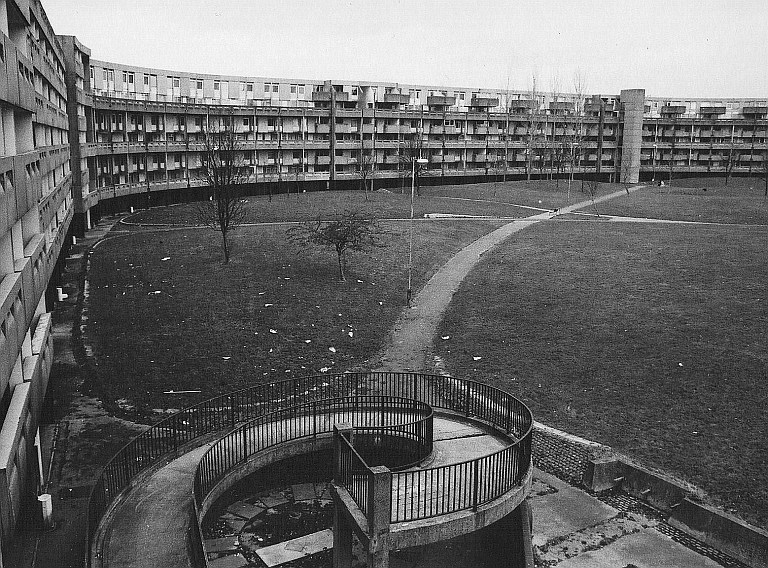John’s Story: 30 Years since the creation of HARP, now known as Manchester Mind
28/10/2019

My role was to bring together different people; provide some leadership and keep us rooted in our values… we made something which I am immensely proud of and I am pleased to see that, the human values that started with HARP, are still alive and well in Manchester Mind today.
Hulme Action Research Project (HARP) was set up in the late 80’s by local church clergy, elders and community workers to respond to the many people living in Hulme who had significant mental health needs, but little in the way of support. There were a lot of “hard to let tenancies” and so it was easier for vulnerable people to get a tenancy and easier for social workers to place people there. However, it was not so easy for services to deliver support in Hulme and so there existed a “revolving door”, with people being admitted to psychiatric hospital and then discharged without follow up support and then re-admitted and so on.
Tackling this was HARP’s mission.
Hulme was a vibrant diverse place with many different communities and estates, an extensive network of Voluntary and Community Sector organisations (VCS), tenants’ associations and a multitude of church-based and city council community workers. So, there were lots of places to go, to get active and to be with other people, but many people with mental health needs struggled to access any of this.
I had been living in Hulme since 1987 and was already involved in the Tenants Alliance and volunteering to help get Drugs Advice in Hulme (DASH) and the Zion Community Health and Resource Centre (ZCHRC) established when I was hired by HARP as a community mental health worker in September 1989.
Initially, I worked from my flat but after the probation service moved out of the Zion building (now Z-Arts) in November we moved in and invited other VCS organisation to join us, this was made easier as DASH already had a foot in the door. We set up a committee, registered as a charity, negotiated with the city council for a tenancy and secured funding from Manchester Health Authority for the rent on the understanding that NHS drugs and mental health services would also be placed there.
We brought together local activists, residents community workers and mental health workers who I had worked with previously to spend a day together talking about mental health in Hulme. This resulted in the recruitment of mental health workers onto the HARP committee and the establishment of the Hulme Mental Health Forum.
At this point the HARP committee agreed to dissolve, as it had achieved its initial mission and a new body was established. The same acronym was retained but research was changed to resource. One of the church community workers remained as treasurer for several years and the churches continued to play a central role in day to day support for vulnerable people.
A key task was to establish HARP’s and the ZCHRC’s distinctive person-centred approach. I started by receiving referrals from probation, housing and mental health services, other tenants, local activists, churches, and local GP’s for people who had severe and enduring mental illness. It quickly became apparent that the most common factors impacting on people’s mental health were poor accommodation, money and benefit problems, conflict with other residents especially when acutely unwell and a lack of social support or things to do.
The committee took the view that we must tackle these underlying causes first and so we sought funding to employ people with expertise in housing advice, welfare rights and practical resettlement support work. We also ensured that the Zion building was a friendly and welcoming space for vulnerable people to drop in and get help. Zion Arts Paint Box (ZAP) was our first drop-in service which was run by a worker from the Roving Day Care service. Subsequently one of our workers established the HARP Café sports-based drop-in services and YASP (Young Advice Services and Project).
I had already worked in statutory mental health services in Manchester from 1985-88 and was lucky to work with some great and inspiring people, some of whom I am still in touch with. I was always drawn to the more radical approaches in mental health and so I was frustrated with how difficult it was to develop human or person-centred services in the NHS.
For me HARP and the voluntary sector offered an opportunity to create this more radical person-centred approach. It was quite edgy at times, but I was surrounded by lots of good people who wanted to do something similar. My role was to bring together different people; provide some leadership and keep us rooted in our values. I relied on others to contain my enthusiasm and keep it real but together we made something which I am immensely proud of and I am pleased to see that, the human values that started with HARP, are still alive and well in Manchester Mind today.
Locally run holistic services like HARP and Manchester Mind working side by side with specialist statutory services are, in my view, the best way to support the mental health and wellbeing of people and communities. It is worth noting that while there have been improvements in the quality of Hulme’s housing, it is the hostile and austere environment that undermines people’s mental health and wellbeing. This is much worse now than it was when we set up HARP in 1989 and, it has become much harder to support people and so the need for independent organisations like Manchester Mind is greater than ever.
Find out more about Our Story.
Nobody in Manchester should face a mental health issue alone
To help us make a difference please text MM2022DONATE to 70085 and donate £5
Thank you for your kind support
